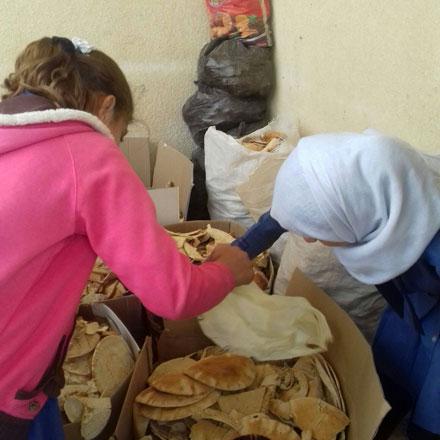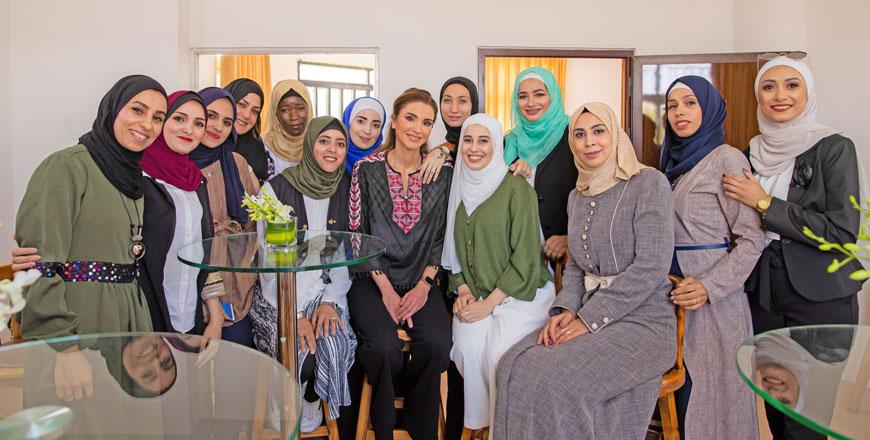AMMAN — Abdul Rahman Zghoul, a schoolteacher, is aware that giving bread to the needy has a deeper meaning in a community where bread is the staple food and a symbol of sufficiency, when available.
In the Jordanian and Arabic culture in general, bread is respected and even leftovers are not thrown in the garbage bin, unlike other foods.
Zghoul played on this social detail when he recently launched an initiative, collecting leftover bread from the community, families of schoolchildren and students themselves, and exchanging it for needed money to help poor students and pay for maintenance to the school building where he teaches.
Zghoul, 24, teaches at the public Al Rashid Secondary School in Ruseifa, a crowded, mostly refugee community to the east of Amman.
He said about 45 enthusiastic students from the school and other nearby schools help him in the implementation of the project, which is one of several initiatives supported by the Youth Empowerment Windows Initiative, which is part of the Democratic Empowerment Programme, “Demoqrati”, launched by His Majesty King Abdullah last year and is implemented by the King Abdullah II Fund for Development.
Zghoul said he reached an agreement with livestock breeders in the area under which they buy 10 sacks of leftover bread for JD25.
“I took part in several regional and international programmes on environment protection and have always been keen on doing something that will help protect the environment in Jordan,” Zghoul, a graduate with a degree in biology from the Hashemite University, told The Jordan Times last week.
Zghoul, who said he has been working as a volunteer with several NGOs in the field of environment protection over the past five years, said he took part in the Leader Global Environmental Issue Programme which is supported by the US embassy in Amman and entailed a six-week training in six states in the US. In addition, he said he took part recently in the Tunza International Youth Conference in South Africa, which focused on environmental protection training. He was also recognised as a youth ambassador by the Arab Thought Foundation in the UAE.
“I realised that students at the school throw away the leftover bread or leave it beside the windows in the classroom. Even their families throw lots of leftover bread away and put it in sacks near garbage containers. People use a lot of bread in our community and still throw away a lot of leftover bread,” Zghoul explained.
“Currently, I put boxes around the school where children can throw their leftover bread. Student volunteers help me by touring the neighbourhoods in the area every Saturday to collect leftover bread from households,” he said.
He said the money collected in return for selling leftover bread is used to give poor students a certain amount of money per day so they do not resort to quitting school to work and make money. The money is also used to buy books, stationery to use at school and is even used sometimes to finance maintenance to the school.
“The amount we make at present per week is modest, but I am optimistic that after my initiative was adopted by the Demoqrati programme I will be able to expand it, collect more bread, make more money and help more students,” he said.
Zghoul said officials in charge of Demoqrati have pledged to provide financial support to the initiative, adding that he will use the money to print T-shirts highlighting the initiative’s main objective to raise awareness among people on the campaign and will install boxes in certain spots in Ruseifa where people can leave the leftover bread.
In addition, he will hold a workshop for students from several schools in the area about how best to keep the environment and encourage recycling.
Demoqrati’s four youth empowerment “windows of opportunity” seek to encourage young people to join voluntary initiatives, institutionalise existing youth initiatives, support local community organisations to expand the outreach of their projects, and provide financial and technical support to larger projects to turn them into nationwide initiatives that reach the Kingdom’s governorates.
Seeking to enhance the values of democracy, enroot democratic practices in society and push the development process forward, Demoqrati is founded on development-boosting values such as the rule of the law, rejection of violence, acceptance of others, dialogue and accountability, according to the project’s literature.
It seeks to engage all segments of society, especially young people, in building a conscious democratic culture and facilitate it through democratic institutions and supportive civil society organisations, based on confidence in the country’s ability to make change and progress in its development process.

















